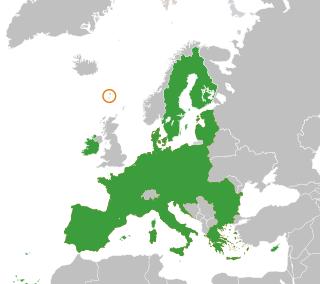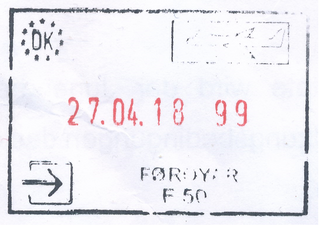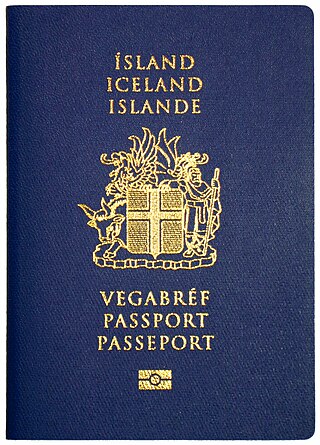
The Common Travel Area is an open borders area comprising the United Kingdom, Ireland, the Isle of Man and the Channel Islands. The British Overseas Territories are not included. Based on agreements that are not legally binding, the internal borders of the CTA are subject to minimal controls and can normally be traversed by British and Irish citizens with minimal identity documents. The maintenance of the CTA involves co-operation on immigration matters between the British and Irish authorities.
The right of abode is an individual's freedom from immigration control in a particular country. A person who has the right of abode in a country does not need permission from the government to enter the country and can live and work there without restriction, and is immune from removal and deportation.

The Nordic Passport Union allows citizens of the Nordic countries – Iceland, Denmark, Norway, Sweden, and Finland – to travel and reside in another Nordic country without any travel documentation or a residence permit. Since 25 March 2001, all five states are also in the Schengen Area.

A travel document is an identity document issued by a government or international entity pursuant to international agreements to enable individuals to clear border control measures. Travel documents usually assure other governments that the bearer may return to the issuing country, and are often issued in booklet form to allow other governments to place visas as well as entry and exit stamps into them.

The visa policy of the Schengen Area is a component within the wider area of freedom, security and justice policy of the European Union. It applies to the Schengen Area and to other EU member states except Ireland. The visa policy allows nationals of certain countries to enter the Schengen Area via air, land or sea without a visa for stays of up to 90 days within a 180-day period. Nationals of certain other countries are required to have a visa either upon arrival or in transit.

A Danish passport is an identity document issued to citizens of the Kingdom of Denmark to facilitate international travel. Besides serving as proof of Danish citizenship, they facilitate the process of securing assistance from Danish consular officials abroad.

The Schengen Area is an area comprising 27 European countries that have officially abolished passports and many other types of border control at their mutual borders. Being an element within the wider area of freedom, security and justice policy of the European Union (EU), it mostly functions as a single jurisdiction under a common visa policy for international travel purposes. The area is named after the 1985 Schengen Agreement and the 1990 Schengen Convention, both signed in Schengen, Luxembourg.
Being part of the Kingdom of Denmark, the foreign relations of Faroe Islands are handled in cooperation with the Danish government and Government of Faroe Islands.

The Faroe Islands, a self-governing nation within the Kingdom of Denmark, is not part of the EU, as explicitly asserted by both Rome treaties.

Visitors to Montenegro must obtain a visa from one of the Montenegrin diplomatic missions unless they come from one of the visa exempt countries. Visa policy is regulated by Regulation on Visa Regime Act. Where there are no diplomatic or consular representations of Montenegro, visa requiring foreigners may obtain them from diplomatic or consular representations of Serbia, Bulgaria and Croatia.

Visa requirements for Danish citizens are administrative entry restrictions by the authorities of other states placed on citizens of the Kingdom of Denmark as a sovereign state comprising the three constituent countries: Denmark, Greenland and the Faroe Islands.

Visitors to North Macedonia must obtain a visa from one of the North Macedonia diplomatic missions unless they come from one of the visa exempt countries.

The visa policy of the United Kingdom is the policy by which His Majesty's Government determines visa requirements for visitors to the United Kingdom, and the Crown dependencies of Guernsey, Jersey, and the Isle of Man and those seeking to work, study or reside there. All intended entrants must obtain a visa unless they are exempt.

The visa policy of Ireland is set by the Government of Ireland and determines visa requirements for foreign citizens. If someone other than a European Union, European Economic Area, Common Travel Area or Swiss citizen seeks entry to Ireland, they must be a national of a visa-exempt country or have a valid Irish visa issued by one of the Irish diplomatic missions around the world.

National identity cards are issued to their citizens by the governments of most European Economic Area (EEA) member states, the exceptions are Denmark and Ireland. Ireland however issues a passport card which is a valid document in the EEA and Switzerland. Denmark issues simpler identity cards that are not valid as travel documents. From 2 August 2021, new identity cards are harmonized as a common identity card model replaced the various formats already in use. There are approximately 200 million national identity cards in use in the EU/EEA, including 53 million of the new EU-standard cards. They are compulsory in 14 EU countries, voluntary in 9 countries and in 8 countries they are semi-compulsory. Where the card is compulsory, in some member countries it is required to be carried at all times, while in other countries the mere possession of the card is sufficient.

All foreign nationals visiting Seychelles are granted visa free access. However, they are required to obtain a Visitor's Permit on arrival unless exempt. The Visitor's Permit is issued free of charge and is initially valid for up to three months but it can be extended for a fee for a period of up to three months with further extensions not exceeding total period of twelve months. They must be in a possession of a valid passport, return or onward ticket, proof of accommodation and sufficient funds.

The British Overseas Territories maintain their own entry requirements different from the visa policy of the United Kingdom. As a general rule, British citizens do not have automatic right of abode in these territories.

The Faroe Islands are an autonomous territory of the Kingdom of Denmark. Nationals of Nordic countries are free to enter, reside and work in the Faroe Islands, and nationals of other countries exempt from visas for short stays in the Schengen Area may also visit the Faroe Islands without a visa. In addition, travel between the Faroe Islands and the Schengen Area is not subject to document checks.

Passports of the EFTA member states are passports issued by the European Free Trade Association (EFTA) member states Iceland, Liechtenstein, Norway and Switzerland. EFTA is in this article used as a common name for these countries.
Controls imposed on internal borders within a single state or territory include measures taken by governments to monitor and regulate the movement of people, animals, and goods across land, air, and maritime borders through border controls.

















